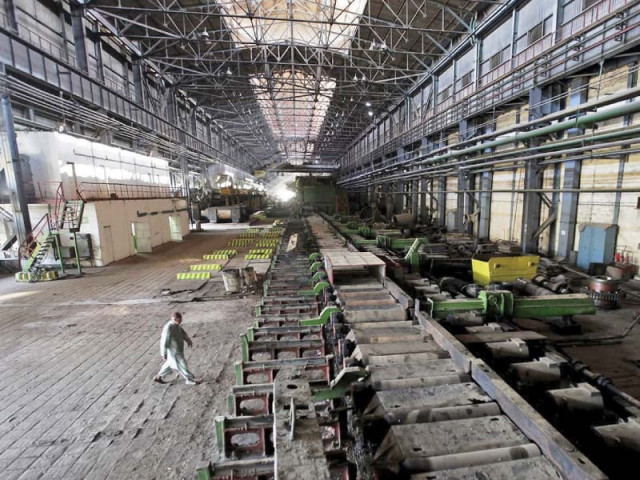PTI govt to consider strategic partner for PSM revival
Expert group puts the mill’s restructuring cost at $1.04 billion which government alone cannot sustain

The PSM revival committee gave a presentation to the ECC and made various recommendations for turning the mill profitable and competitive, said the finance ministry. PHOTO: FILE
The Economic Coordination Committee (ECC) of the cabinet took a briefing from the expert group, which had been set up to explore various options to decide the fate of the country’s largest but closed industrial unit. The group has given an option to revive the mill on the public-private partnership model.
Finance Minister Asad Umar, who is also chairman of the ECC, has been of the firm opinion that all state-owned enterprises could be made profitable without privatising them by improving their governance.
Legally, public-private partnership is like privatisation and under the law and rules of business the Ministry of Privatisation has the mandate to undertake this exercise.
Despite taking over three months to prepare a plan, the work on PSM revival by the expert group still remains “in progress” amid increasing liabilities including outstanding dues and employees’ salaries and pensions.
The expert group did not give an option to liquidate PSM, which the previous Pakistan Muslim League-Nawaz (PML-N) government shut down about four years ago due to non-payment of dues of Rs46 billion to Sui Southern Gas Company.
“The committee (ECC) directed the Industries and Production Division and Privatisation Commission to submit formal recommendations, in the form of a summary, to the ECC for final decision,” said a brief statement issued by the Ministry of Finance after the meeting.
The ECC also discussed the option of setting up a Special Purpose Vehicle (SPV) for parking Rs206 billion worth of PSM liabilities before the mill was offered to a strategic partner for investment. The cabinet body did not take a final decision.
The PSM revival committee gave a presentation to the ECC and made various recommendations for turning the mill profitable and competitive, said the finance ministry.
Owing to paucity of time, the ECC did not take a detailed briefing and only reviewed executive summary of the presentation. The PML-N government had explored all options for the mill’s privatisation like finding a strategic partner or liquidating the mill, but did not take a final decision.
The PTI government has already removed PSM from the active list of privatisation.
The expert group put the cost of reviving the mill that could produce at its existing capacity at $1.035 billion including over $300 million of downstream industry cost, according to a senior government official. However, due to fiscal constraints, some ECC members were of the view that it would not be advisable for the government to pick the cost of revival.
The ECC was informed that nearly half-dozen investors had approached the government with an offer to make the mill profitable including Russian and Chinese investors.
The expert group proposed the hiring of a financial adviser for drawing up a restructuring and revival plan. There were two different views as to which government department will hire the financial adviser. PSM falls under administrative control of the industries ministry but privatisation, in any manner, is the responsibility of the privatisation ministry.
Other matters
The ECC approved a proposal of the Communication Division for providing a technical supplementary grant amounting to Rs500 million for the construction of an additional carriageway on the Torkham-Jalalabad road under the Prime Minister’s Programme for the Reconstruction of Afghanistan.
The ECC decision would not only benefit the people and business community of the two neighbouring countries, but would also help promote trade between Pakistan and Afghanistan as well as Central Asian States, said the finance ministry.
The ECC expressed deep concern over an increase in prices of medicines and food items, and directed the Ministries of National Food Security and Research and National Health Services, Regulations and Coordination to take practical measures to arrest the rise in prices.
The Petroleum Division briefed the committee on the recovery of gas infrastructure development cess (GIDC) from different industrial sections. The committee was informed about the litigation in different courts, which inhibited the collection of revenue in recent years.
The meeting was informed that nearly Rs400 billion of GIDC dues were outstanding against the consumers and a bill to waive half of the amount was pending before the Cabinet Committee for Disposal of Legislative Cases.
Published in The Express Tribune, April 9th, 2019.
Like Business on Facebook, follow @TribuneBiz on Twitter to stay informed and join in the conversation.



















COMMENTS
Comments are moderated and generally will be posted if they are on-topic and not abusive.
For more information, please see our Comments FAQ